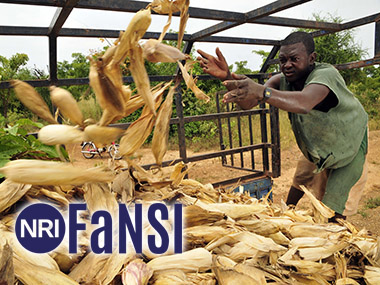
The recent webinar on Food Systems for Improved Nutrition showcased research related to the Food and Nutrition Security Initiative (FaNSI) at NRI, complemented with a series of three external keynote presentations.
View the Webinar recording here
This webinar on 31 January 2023, featured a diverse set of research presentations, collectively highlighting the breadth and depth of NRI’s research on food systems and food and nutrition security (see full programme below).
Presentations from research staff highlighted findings from recent projects in Timor-Leste and Nepal, as well as a review of contemporary food environment research featuring participatory photography methods, and the recently won NUTRI+4AID project.
A series of short presentations from PhD students displayed the exciting research being undertaken by the next generation of researchers, with studies featuring food systems and food environment approaches, the development of scalable solutions to eradicate food borne diseases across LMICs, and the development of ready-to-use-therapeutic-food to tackle the double burden of malnutrition.
A series of three external keynote speakers contributed their insights to the session, with Isabelle Mballa (World Food Programme) presenting on humanitarian food systems and the environment, Akua Tandoh (University of Ghana) providing an overview of the Africa Food Environment Research Network (FERN), and Professor Nick Nisbett presenting The Nutrition Equity Framework in theory and practice. Full keynote speaker profiles are provided below for reference.
Keynote speaker profiles
Keynote 1: Isabelle Mballa (World Food Programme)
Isabelle Mballa is the West and Central Africa Regional Supply Chain Advisor for the United Nations World Food Programme (WFP). She is a food systems expert - with more than 20 years of experience in WFP, and she previously held the role of Chief of Food Safety and Quality Unit at the WFP headquarters. Isabelle currently oversees 19 countries operations. She is responsible for defining and orienting the strategy to source and supply food to enable WFP food assistance in crisis and development contexts to the most vulnerable, particularly women and children. Isabelle presented on “humanitarian food systems and the environment”, drawing from the conceptual framing of the food systems wheel, developed by WFP Ethiopia (Figure 1).

Keynote 2: Akua Tandoh (University of Ghana)
Akua Tandoh is a PhD candidate at the University of Ghana, and kindly agreed to present on behalf of Professor Amos Laar and the Africa Food Environment Research Network (FERN) initiative under the MEALS4NCDs Project” – providing Measurement Evaluation, Accountability and Leadership Support (MEALS) for NCDs prevention in Ghana and beyond. In her presentation, Akua provided an overview and update from the Africa FERN, drawing from her recent article “The Africa Food Environment Research Network (FERN): from concept to practice” that was published in the journal Global Health Promotion in November 2022 (https://doi.org/10.1177/1757975922112615).
Keynote 3: Professor Nicholas Nisbett (Institute of Development Studies)
Nicholas Nisbett is a Senior Research Fellow at the Institute for Development Studies and a Professor of Global Public Policy, Nutrition and Health Equity at the University of Sussex. His recent work has focused on nutrition equity: he co-authored the introductory chapter to the 2020 Global Nutrition Report and is currently a member of the UN Committee on Food Security’s High Level Panel of Experts for a report on inequalities in food systems. He has consulted for a range of international organisations, including UNICEF, FAO and the WFP with evaluations and research focusing on equity; national and community level drivers of nutrition and community accountability in India, Bangladesh and W Africa. Nicholas presents “The Nutrition Equity Framework in theory and practice”, based on his recent article published in the journal Global Food Security (https://doi.org/10.1016/j.gfs.2021.100605). His keynote presentation introduced the background of socio-economic inequity in nutrition outcomes, before outlining the conceptual development of the nutrition equity framework and exploring equity in practice in international nutrition.
Programme
| Presenter | Title |
|---|---|
| Dr Christopher Turner (Chair) | Welcome and housekeeping |
| Keynote presentations 1 & 2 | |
| Keynote 1: Isabelle Mballa (World Food Programme) | Humanitarian food systems and the environment |
| Keynote 2: Akua Tandoh (University of Ghana) | The Africa Food Environment Research Network (FERN): from concept to practice |
| NRI research presentations | |
| Dr Louise Abayomi | School feeding programmes |
| Dr Christopher Turner | Capturing the moment: A snapshot review of contemporary food environment research featuring participatory photography methods |
| Dr Kendra Byrd | Fish-aggregating devices increase fish consumption in households in rural, inland Timor-Leste |
| Dr Dina Nikolaou | Remission of type 2 Diabetes with a traditional diet in Nepal |
| Dr Aurelie Bechoff | NUTRI+4AID: a tool to estimate nutritional postharvest losses in humanitarian value chains |
| FaNSI PhD research presentations | |
| Himadri Pal | Working towards reliable and scalable solutions to eradicate food borne diseases across LMICs |
| Lizzie Saka | A food systems approach to understanding and supporting contributions of small pelagic fish to human diets and nutrition in Malawi. |
| Lydia O'Meara | Food environments and the nutritional adequacy of women's diets in Uganda. |
| Laura Utume | Development of ‘safe for the gut’ ready-to-use-therapeutic-food (RUTF) to tackle the double burden of malnutrition |
| Ebunoluwa Awotunya | Investigating dietary drivers among slum dwellers in the urban food environment of Lagos State, Nigeria |
| Keynote presentation 3 | |
| Keynote 3: Professor Nick Nisbett (Institute of Development Studies) | Holding no-one back: The Nutrition Equity Framework in theory and practice |
| Christopher Turner (Chair) | Closing remarks |

